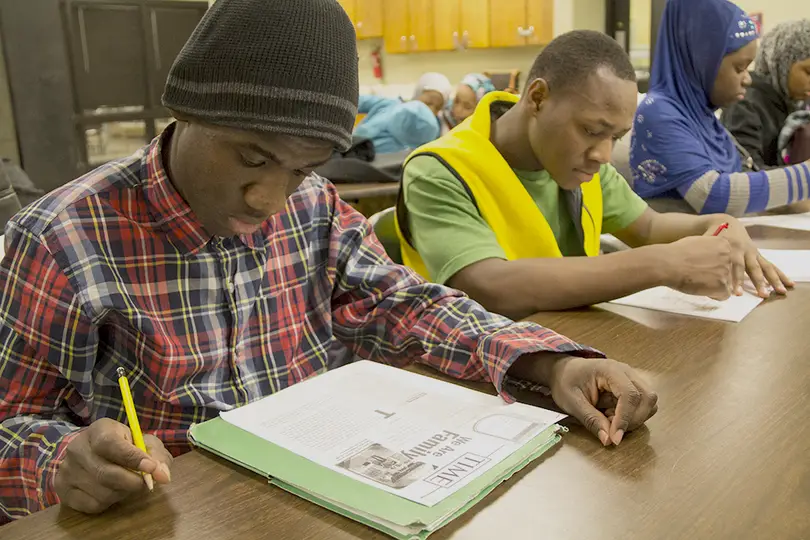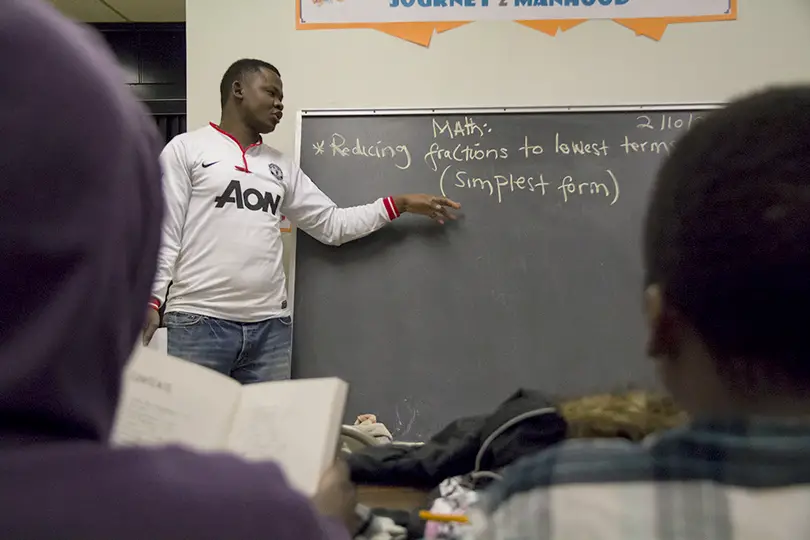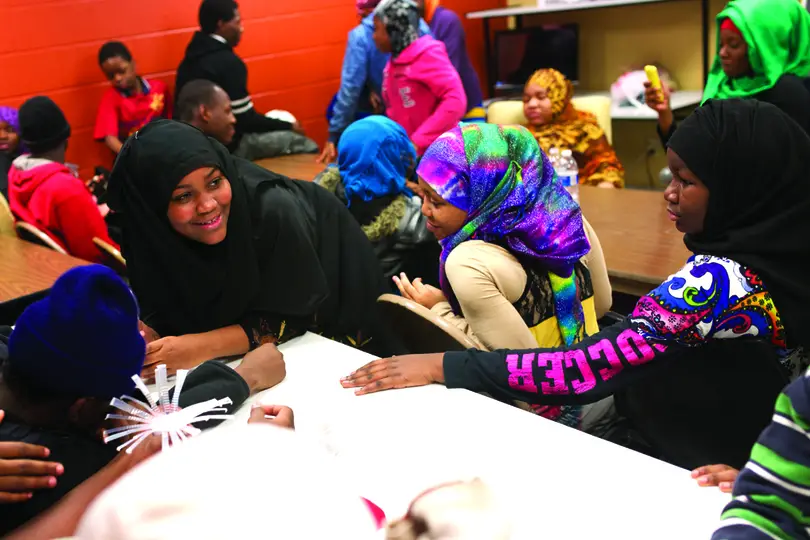Teachable moments: After-school program assists refugee students with homework
Inside the community center located at 401 South Ave., there is a classroom different than most found at Syracuse University. It’s slightly larger than a dorm room, but has space for two long tables and a small chalkboard at the front.
It’s also filled with the voices of 20 or so students ranging in age from kindergarteners to seniors in high school.
At the front of the room stands Osman Ramadhani. He’s in the classroom Monday through Friday from around 4 p.m. until as late as 8:30 p.m.
Ramadhani, 31, is studying math and science at Onondaga County Community College, where he attends classes all afternoon on Mondays and Wednesdays, and in the morning on Tuesdays and Fridays. When he’s free, he tries to finish as much schoolwork as possible.
On the weekends, he works 20 hours as a security officer, doing overnight shifts Friday and Saturday nights — all while raising four kids.
And somehow, amidst all his other commitments, Ramadhani helps run a program that gives refugee students in Syracuse assistance with their homework.
“Most kids don’t always take education seriously and their parents don’t speak English to help the kids,” he said. “So we encourage them to do their homework daily. The thought is to come together to help each other and so kids can help each other.”
All the students are refugees from different countries in Africa, including Kenya and Somalia. Most of them are part of the Wazigua community, which is a particular African culture that has a large population in Central New York. According to the U.S. Department of State, 972 Somali refugees arrived in Syracuse between 2001 and 2011.
Ramadhani said as many as 50 kids will show up to get assistance with their schoolwork on a given day, but when he’s the only one available to help he can only accept 15–30 of them.
Ramadhani is still learning English and is unfamiliar with some topics covered in local schools. In order to make the program as beneficial as possible, he needs help.
He found help when Catherine Nock, an assistant Spanish language coordinator at Syracuse University, brought her honors seminar class to meet Ramadhani and some of the kids in the program in the fall of 2012.
Nock said her class’s first meeting with Ramadhani was more of a chance to meet some of the refugee students who are in the program, but Ramadhani asked if some of the students would be interested in coming to tutor the kids on a regular basis.
Liana Huber, a sophomore television, radio and film major, started tutoring at the program her freshman year with Nock’s class, and started going once a week last semester.
When Huber arrives around 4 p.m., she’s greeted by younger kids running around and coloring since there isn’t much homework for them. Meanwhile, the older kids in the program talk about their day and begin working on their schoolwork.
Huber said she often checks the students’ homework since many of them don’t have anyone else to do it for them.
“I remember I’d always give my math homework to my dad and he’d check it over, but they don’t really have that with their families,” she said.
While Ramadhani doesn’t always know the material, Huber said she faces a different challenge when she volunteers at the program because being a teacher is much harder than it seems.
“It’s easier to just do it for them and say ‘this is the answer,’ but you have to feel out what each individual needs,” Huber said. “They don’t always just need answers.”
In addition, it can be difficult to hold the attention of some of the younger students, said Lauren Murphy, a senior photojournalism major, who started volunteering a few weeks ago. Like any other kid, they just want to relax and have fun, said Murphy, who is also a staff photographer for The Daily Orange.
But the attention SU students give to the refugee students is well received.
“Usually I try to do (homework) by myself, and sometimes I give up or wait to ask the teacher the next day,” said Mukoma Mukoma, a sophomore at Nottingham High School in Syracuse. “The (SU) students take the time to make you understand, no matter what.”
Madina Mosa, a junior at Nottingham High School, said if she doesn’t know a subject, an SU student can help answer her questions. Mosa said SU students’ past experience makes her more confident since they know the subject.
Ramadhani added that students at the program enjoy the opportunity to get academic help from SU students.
“The kids love Syracuse University kids because it’s who they depend on when they ask questions to get answers,” he said.
But it’s not just academic help that the SU students provide.
Huber said she’s spoken with a few students in the program about SATs, college life and what it’s like attending SU. “These are conversations they can’t really have at home,” Huber said.
The refugee students, especially the older ones in the program, said they like hearing about what college life is like just up the hill.
Mukoma, who goes to the program Monday through Friday, said he appreciated that SU students were willing to talk with him about his college plans, including what he might like to study.
“Usually people wouldn’t worry about where you’re going to be in the future,” he said.
Ramadhani added that having SU students around kids in the program gives an example of how important education is, and where the younger kids can end up if they continue working in school.
“The SU part shows students what they can do if they work hard,” said Nock, the Spanish instructor. “It gives them inspiration for their own futures.”
But while the program has been incredibly helpful for many of the refugee students, there is still a need for more tutors.
Huber said SU students have trouble with finding time and transportation to get to the center.
“It’s hard to get people to go on their own because it’s not like you can just walk over to Schine and do it,” Huber said.
Ramadhani said the kids have benefitted from the program and enjoy their time there, but additional tutors would make a difference.
“They’re trying. They don’t always do 100 percent, but they’re trying,” he said. “(The kids) love to learn and go to school, we’re just missing people to help them and give them attention, otherwise they want to learn the material.”
Regardless of how many tutors they have, the center has proved to be a safe and supportive environment for the kids to learn.
For now, they have Huber, Murphy and a few others who regularly stop by, as well as Ramadhani, who serves as an example of where their education, hard work and dedication could take them.
Published on February 26, 2014 at 1:14 am
Contact Brett: [email protected] | @Brett_Samuels27







